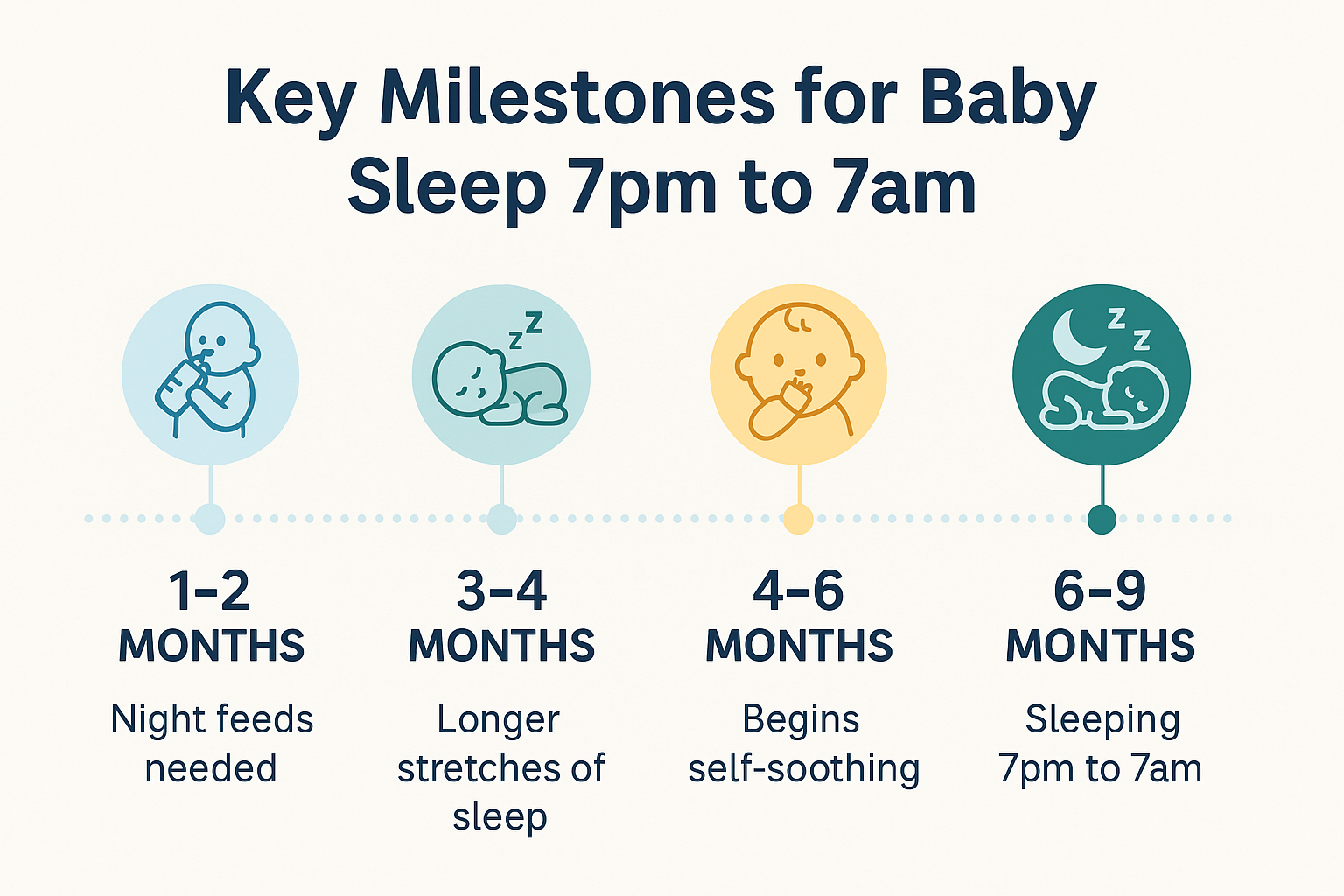
Quick Answer for Tired Parents
Most babies can sleep a full 12 hours (7pm to 7am) between 3 and 6 months of age — typically once they weigh around 15–16 pounds, no longer need night feeds, and can self-soothe.
Key points to remember:
-
Average age: 3–6 months, but some take longer
-
Readiness signs: longer sleep stretches, fewer feeds, self-soothing
-
Biggest helpers: consistent bedtime routine, dark and quiet sleep space, gentle night weaning
-
Possible delays: illness, regressions, teething, growth spurts
If you’re reading this at 3 a.m., rocking a baby in one arm and scrolling your phone with the other, you’re not alone — every parent has been here at some point.
When Most Babies Sleep Through the Night
Every baby’s sleep timeline is different, but the sweet spot for 7pm–7am sleep is often between 3 and 6 months.
By this stage:
-
Their stomach can hold enough milk to get through the night without a feed.
-
Sleep cycles are becoming more adult-like.
-
They’ve learned (or are learning) to self-soothe between sleep cycles.
Quick reality check: Some babies hit this milestone earlier, some later. Genetics, temperament, and feeding method all play a role.
???? Tip: If your baby is waking frequently and you’re not sure if it’s hunger or habit, read our guide to infant hunger cues.
Signs Your Baby Is Ready for 7–7 Sleep
You might notice:
-
Longer stretches at night — already doing 5–6 hours without waking.
-
Self-soothing — sucking fingers, rolling to a comfy position, or murmuring themselves back to sleep.
-
Predictable daytime naps — better daytime rhythm often means better nights.
If illness strikes (fever, cold, etc.), even the best sleeper can revert to night waking. Check our baby fever guide for what’s normal and when to call your pediatrician.

Why Some Babies Take Longer
It’s not always about what you’re doing — sometimes it’s biology, growth, or health. Common reasons include:
-
Premature birth — may need more time to mature sleep cycles.
-
Digestive discomfort — reflux, gas, or overfeeding can interrupt sleep (read our article on breastfeeding & overfeeding vomiting).
-
Growth spurts — appetite increases, leading to night feeds again.
-
Teething — discomfort may wake them more often.
-
Sleep regressions — especially around 4 months, when brain development changes sleep patterns.
How to Help Your Baby Sleep 7pm to 7am
1. Create a Consistent Bedtime Routine
Babies thrive on predictability. A 20–30 minute wind-down each night might include:
-
Warm bath or gentle wipe-down
-
Fresh diaper & cozy sleepwear
-
Feeding
-
Quiet story or lullaby
-
Cuddle and lights out
2. Make the Room Sleep-Friendly
-
Keep it dark (blackout curtains help)
-
Use white noise to mask household sounds
-
Keep the temperature cool (68–72°F)
3. Gentle Night Weaning
If your baby still wakes for feeds but is otherwise ready for longer nights:
-
Gradually reduce the amount offered in night feeds
-
Increase daytime calories
-
Offer comfort without feeding (rocking, gentle shushing)
4. Check Bedtime Nutrition & Safety
If you’ve got an older baby approaching toddlerhood, remember some foods are still off-limits — like honey. Here’s why in our guide on why babies can’t eat honey.
Common Sleep Disruptors & Fixes
-
Illness – Even mild colds can disrupt sleep. See our strep throat guide for one example of when to seek help.
-
Seasonal bugs – Keep an eye on what’s going around locally.
-
Teething pain – Offer teething-safe toys before bed.
-
Developmental leaps – Rolling, crawling, or standing can trigger excitement wake-ups.
-
Travel or schedule changes – Try to maintain parts of your bedtime routine on the go.
FAQ: Baby Sleep 7pm to 7am
Q: Is my baby too young to sleep 12 hours?
If under 3 months, yes — most newborns need 1–2 feeds at night for growth.
Q: What if my baby still wakes for a feed?
Night weaning is gradual — some babies drop feeds naturally, others need gentle coaching.
Q: Can I sleep train during illness?
Not recommended — focus on comfort first. See our baby cough guide for signs of more serious illness.
Q: Should I dream feed?
It can help some babies extend sleep, but isn’t always necessary — try and see if it works for your family.

When to Call Your Pediatrician
Contact your pediatrician if:
-
Your baby is over 9 months and still waking multiple times without illness or teething
-
You notice symptoms of illness like fever, persistent cough, or rash
-
There’s vomiting or signs of dehydration — fewer wet diapers, dry lips
-
Night waking is paired with sudden behavioral changes
Bottom Line
Sleeping 7pm to 7am isn’t a competition — it’s a developmental milestone that happens on its own timetable. Some babies will get there early, others later, and that’s okay.
With a bit of consistency, a lot of patience, and the reassurance that rough nights don’t last forever, you’ll get there — and so will your baby. And when you do, you might just find yourself… missing those middle-of-the-night cuddles.
Worried about your little one’s health or development? Give East Lake Pediatrics a call — we’re here to listen, answer questions, and help your family thrive
This post is for information only and isn’t a substitute for medical advice. If you have concerns about your child’s health, please reach out to your pediatrician.

